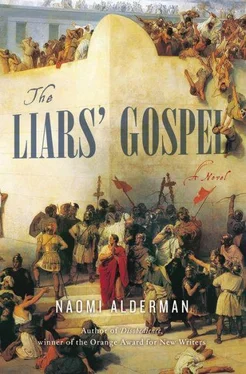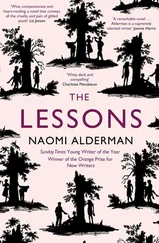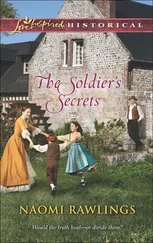He had done work on the Sabbath, they said, and she laughed and said, “Yehoshuah? Who never did a stick of work the other six days of the week?” And they laughed too, because nothing is funnier than a mother mocking her own son, and agreed that perhaps on this point she was right.
Yosef, she noticed, did not laugh at this joke.
As they were getting ready for sleep, he said to her, “It’s not enough that he’s run away? Now he brings disgrace on the family?”
She did not bother to argue. He wanted to lie with her that night, but she refused him, and he made that special noise again, of unconquerable exasperation.
Those friends who loved her best told her simply that Yehoshuah was changed. That he seemed frightening sometimes, or frightened himself. Those who loved her best told her that it had been hard to recognize him, that something in him had begun to work differently, that even his face was changed. One said she heard he had been questioned by the Roman guard but they had not held him.
“You should go to talk to him,” she said to Yosef one night.
He looked at her.
“It’s your job,” she said, because this sometimes called him to his duty. “You are his father. You should go and see that all is well with him. I’m worried about him.”
“You’ve always worried about him over the wrong things.”
“Rahav said she’d heard that the guard questioned him. You should go there. Talk to him. Bring him home. Please.”
He stared at her levelly. His beard was all gray now, and his eyes wrinkled and his skin burnished, and where now was the young strong husband who had lifted her up with one hand? And had loved her? She had thought that he had loved her.
“No,” he said, “he will have no more from me.”
“Then I will go myself.”
He breathed in and out. She saw in his face the same lines as Yehoshuah’s face. The same angry stiff mouth, the same twitching brow. They had the same anger, that was the problem.
“I forbid it. Do you understand? You are not to bring disgrace upon us. I forbid it.”
She looked at him. Whatever he had been, he was not it anymore.
“I understand,” she said.
It was around two weeks after that when Yosef went north to take a look at some lumber and to trade. And she called her grown sons to tell them what she intended, and they agreed to it.
She will not go with her family to Jerusalem this Passover. Her brother Shmuel will make a sacrifice for her. She and her sister and Shmuel’s wife will stay behind, as they did when they were young women with many small children to care for. But still, although she will not eat the sacrificed lamb with them in Jerusalem, there are duties to be performed. The house must be cleaned, every jar that has held flour must be emptied and scoured.
Gidon helps her, carrying the wool blankets back from the stream when they are heavy and sodden and throwing them over the rope she has tied between two trees. He climbs into the back of the clay-and-reed flour store and washes the stone floor, bent double, inhaling the flour dust, so that when he comes out his eyes are red and his back cracks as he stands up. They do not speak of the anniversary that is fast approaching until the very eve of Passover.
The day before Passover is time to bake the matzot — the flat unrisen bread that they will eat for the next week. The flour cakes will last overnight, she will wrap them in cloth and put them in a stone jar to keep off insects and mold. She puts the flat stone into the fire to heat, takes three measures of flour from the jar and pulls up a bucket of cold clear water from the well. She begins to mix the water into the flour — swiftly, because her mother taught her that matzot should be made as quickly as possible — pulling it into a dough, forming round flat cakes, pummeling them out with the heel of her hand, stretching the dough to thinness. She makes dots in the surface of each cake with a wooden point, then quickly tosses them onto the heated stone, where they immediately begin to bubble and crisp, becoming fragrant with wood smoke and with flakes of burnt flour on the surface.
When she looks up, she sees that Gidon is watching her. She does not know how long he has been there. He watches her so tenderly. He must have seen his own mother perform this task.
“We ate them, the last meal with Yehoshuah,” he says at last.
Her blood is chilled and her bones are old ash. She does not want to know what they did. She wants to know everything. Her mouth tries to say, “Don’t tell me.” Her breath longs to beg him for every detail. She is thirsty for every moment she missed. She wants to ask if there was a crumb in his beard from the unrisen bread. Did he remember to change his clothes before the festival started? Would anyone but a mother notice? The desire, always coiled in her, always ready to pounce, springs now: the desire to wail and say why was I not there at his last meal, why did I not force him to come home?
All this rises up in her. She throws another flat round matzo cake onto the hot stone. She looks at Gidon.
“I miss him too,” the boy says.
And she cannot help herself. There are always tears in her now. Her voice cracks and she says, “You do not know what it means to miss him.”
She picks raw dough from her fingertips and lifts the flat matzo from the stone.
Gidon’s eyes, too, are filled with tears.
He says, “I have not your right.”
She finishes the baking, wraps the flatbreads in a cloth. Her sister will arrive soon with the lamb, so she banks the fire up high, with the hyssop grass and herbs she has dried for the occasion. Gidon gathers armfuls of green branches to make a smoky fire, separating out the dry logs which will burn long and evenly.
She says, “Did he ever speak of me?”
Gidon pauses and thinks. She can see that he wants to be kind to her.
“He spoke about his father,” he says, “or he told stories about a good father, and that father I think is God, who reigns above. There are many stories and sayings he told about fathers.”
“But not mothers?” she says.
He shakes his head slowly, and she can see the thought is only now occurring to him.
“He told a story of a widow,” he says. “Perhaps that widow called you to mind?”
“Perhaps,” she says.
She believes Gidon that her son didn’t talk of her, or ask for her, or even think of her. He had distanced himself from her deliberately a long time before.
People said he was out of his mind.
They agreed to journey to see him speak. Word came that he had circled round in a wide loop, through Hoshaya and Cana towards Emek. It was a long trek — a quarter of a day or a little more. Yosef would be away for several days longer and they need never tell him where they’d been. It was a bad business, to lie to him, but the brothers all agreed, and if the younger ones blurted something out, they could say that they had imagined it, dreamed it. Yehoshuah was their oldest brother and they wanted to see him.
They took the donkey, loaded it with water skins, bread and cheese and walked. At S’de Nachal, they met a woman on the way, her hair uncovered, carrying a baby at her breast wrapped in a woolen blanket.
She said, “Are you going to see the teacher?”
Iov opened his mouth to answer but Miryam interrupted him.
“What teacher is that?” she said.
The woman checked on the baby, fussing and pawing, its little hand waving as it struggled to latch on to the nipple. Though her breast was covered, the older boys looked away, disgusted or embarrassed.
She shrugged. “Some teacher. I saw one last winter who cast a live snake out of Rakhel who had the pain in her gut. She vomited, and it came up and crawled into the grass covered in her blood and slime. Rakhel was better for a while after that, and after that she was worse and then she died.”
Читать дальше












